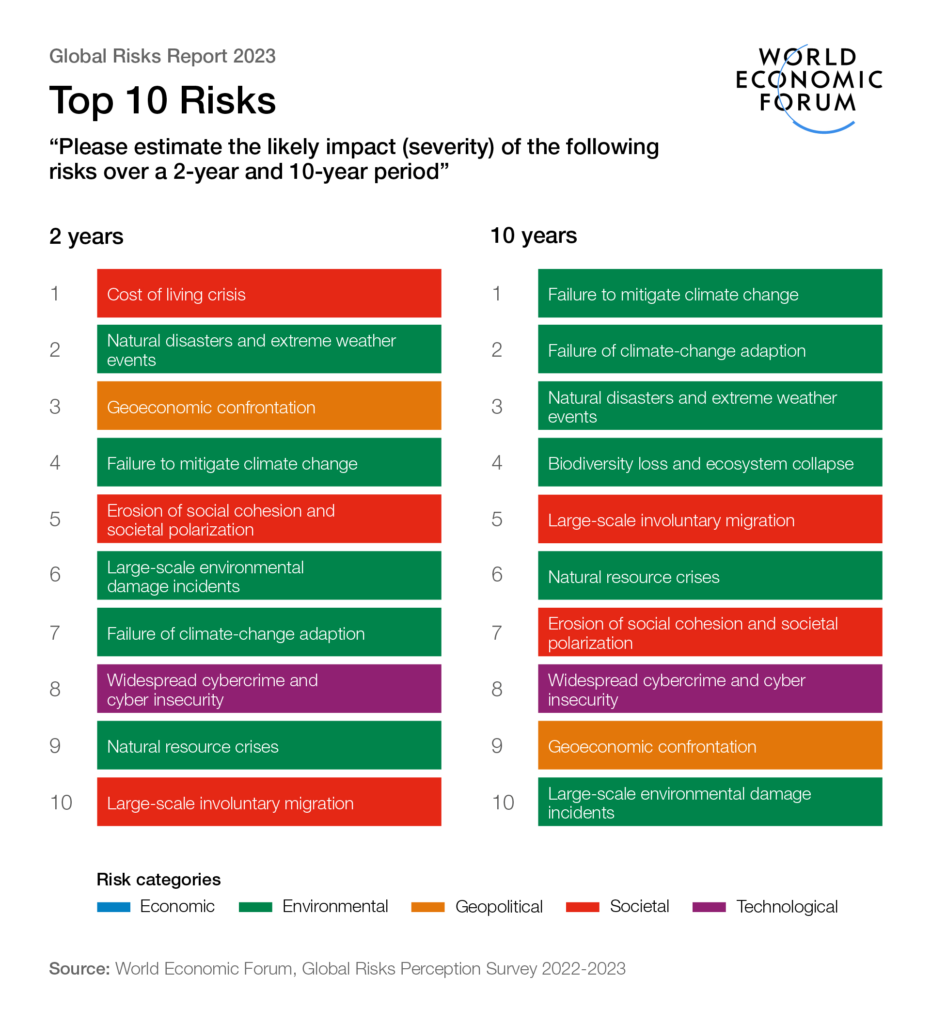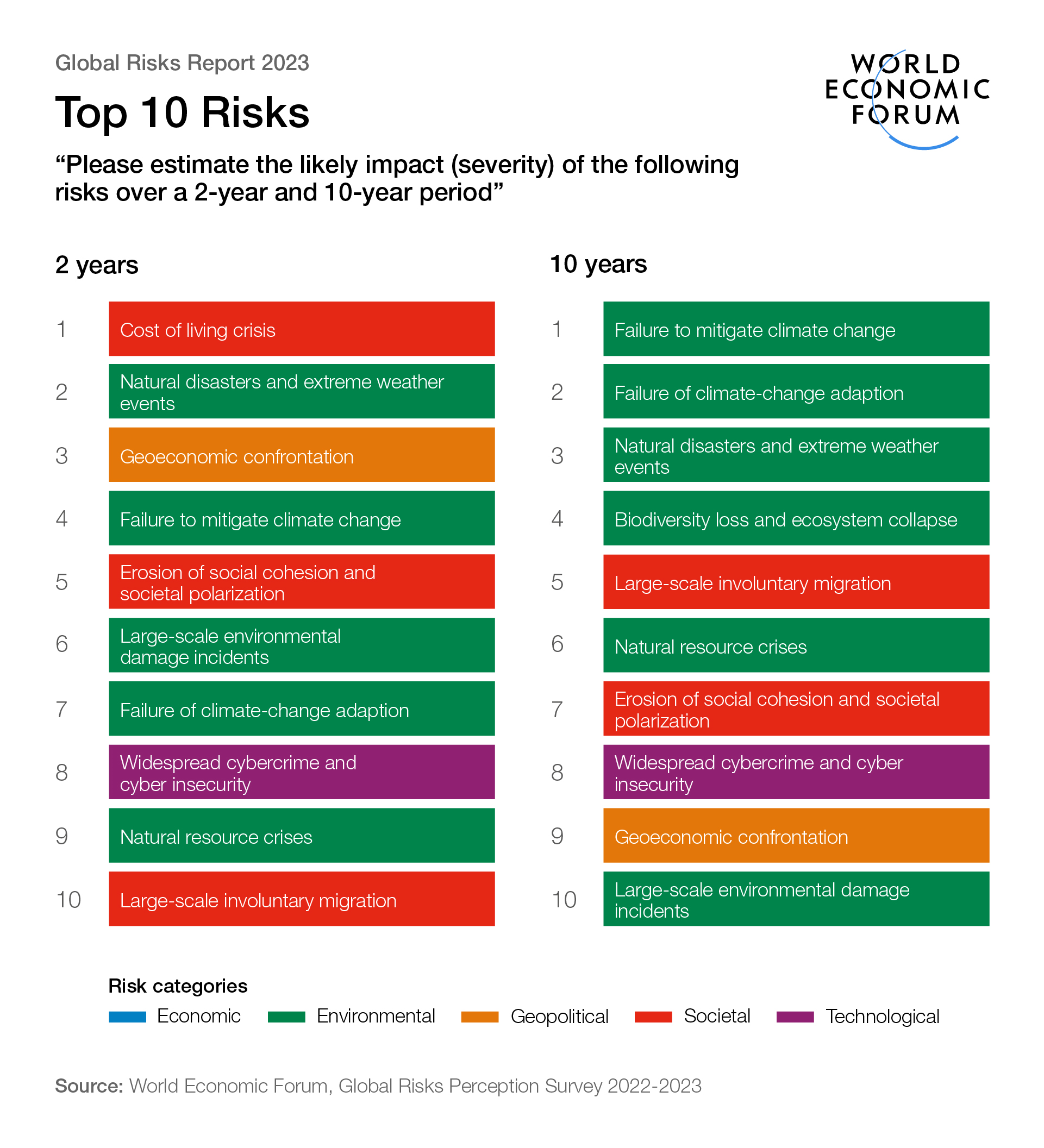Short-term risks are threat to efforts to tackle longer-term risks as they are notably related to climate change, new report by World Economic Forum says.

LONDON
The cost of living crisis is the biggest short-term global risk while the failure of climate mitigation is the number one long-term concern, according to the World Economic Forum’s (WEF) Global Risks Report 2023, launched Wednesday at a news conference.
Warning of deeply interconnected risks, the WEF said the tensions have triggered “a series of interconnected global risks,” including energy and food supply shortages, dramatic increases in the cost of living and debt servicing.
The report, produced in partnership with Marsh McLennan and Zurich Insurance Group, is based on input by 1,200 global risk experts, policy-makers, and industry leaders.
The pandemic and the ongoing Russia-Ukraine war have brought energy, inflation, food and security crises back to the fore, according to the WEF’s report.
These crises follow-on risks that will dominate the next two years — the risk of recession, growing debt distress, a continued cost of living crisis, polarized societies enabled by disinformation and misinformation, natural disasters, extreme events, and zero-sum geo-economic warfare.
“The short-term risk landscape is dominated by energy, food, debt and disasters. Those that are already the most vulnerable are suffering and in the face of multiple crises, those who qualify as vulnerable are rapidly expanding, in rich and poor countries alike,” Saadia Zahidi, the managing director at WEF, said on the findings of the report.
“In this already toxic mix of known and rising global risks, a new shock event, from a new military conflict to a new virus, could become unmanageable.”
She said climate change and human development should be at the heart of concerns of world leaders to boost resilience against future shocks.
The current short-term crises are threat to efforts to tackle longer-term risks as they are notably related to climate change, biodiversity, and investment in human capital, as the window for action on the most serious long-term threats is rapidly closing and collective action is needed before risks reach a tipping point, the report noted.
The failure of climate mitigation and climate adaptation are now the biggest global risks for over the next 10 years. The lack of more effective cooperation will lead to increasing global warming and ecological breakdown.
Climate-related risks represent half of top 10 long-term risks
The failure of mitigation and adaptation to climate change, natural disasters, biodiversity loss, and environmental degradation represent five of the top 10 risks, according to the head of sustainability risk at the Zurich Insurance Group.
“The interplay between climate change impacts, biodiversity loss, food security, and natural resource consumption is a dangerous cocktail,” John Scott noted.
“Without significant policy change or investments, this mix will accelerate ecosystem collapse, threaten food supplies, amplify the impacts of natural disasters, and limit further climate mitigation progress.”
Large-scale involuntary migration, erosion of social cohesion, societal polarization, widespread cybercrime and cybersecurity, geo-economic confrontation, and large-scale environmental damage incidents are the other top 10 global risks in the long-term.
Collective, immediate action needed to address risks
The report also called on world leaders to “act collectively and decisively, balancing short and long-term views,” recommending “joint efforts between countries as well as public-private cooperation to strengthen financial stability, technology governance, economic development and investment in research, science, education and health.”
“If we speed up action, there is still an opportunity by the end of the decade to achieve a 1.5 C trajectory and address the nature emergency. Recent progress in the deployment of renewable energy technologies and electric vehicles gives us good reasons to be optimistic,” Scott stressed.
The goal of limiting global warming by 1.5 C by the end of the century was agreed in the 2015 Paris Agreement, but the world is on track to go well beyond this threshold as the efforts are not sufficient to achieve necessary emissions cuts.
Carolina Klint, the risk management leader covering Continental Europe at Marsh, said this year is set to be marked by increased risks related to food, energy, raw materials, and cyber security, causing further disruption to global supply chains and affecting investment decisions.
“No country is immune to these crises,” she pointed out.
“At a time when countries and organizations should be stepping up resilience efforts, economic headwinds will constrain their ability to do so,” she said. “Faced with the most difficult geo-economic conditions in a generation, companies should focus not just on navigating near-term concerns but also on developing strategies that will position them well for longer-term risks and structural change.”
Source: https://www.aa.com.tr/en/environment/cost-of-living-crisis-biggest-short-term-climate-change-largest-long-term-global-risk-report/2784903

